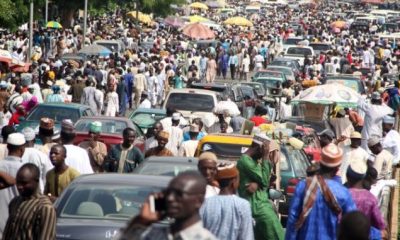News
NBS Says 21.76m Nigerians Unemployed In 2020

THE National Bureau of Statistics (NBS) has put the total number of unemployed Nigerians at 21,764,617. The figure is contained in the bureau’s Labor Force Statistics website entitled “Unemployment and Underemployment Report (Q2 2020) released in Abuja.
It referred to the report as an Abridged Labour Force Survey under COVID-19 for August 2020. According to NBS, the unemployment rate during the period under review represented a 27.1 per cent rise from the 23.1 per cent recorded in the third quarter of 2018.
“A rise in unemployment generally means the number of people searching for jobs has increased, which can occur because people previously outside the labour force have decided to join the labour force and are now in search of jobs.
“Or people previously working have lost their jobs and are now in search of jobs. Often, it is a combination of these two,” the NBS said.
According to the report, the total number of people in employment during the reference period is 58,527,276. The statistic of those employed showed a 15.8 per cent reduction in employment in the third quarter of 2020.
Of this number, 35,585,274 were in fulltime employment and worked for 40 hours or more per week, while 22,942,003 were underemployed Nigerians who worked between 20 to 29 hours per week.
The number of persons in the labour force, people within ages 15 to 64, able and willing to work, was estimated to be 80,291,894. The figure represented an 11.3 per cent decrease in the number of persons recorded in the third quarter of 2018.
Of this number, those within the age bracket of 25 to 34 were highest with 23,328,460, representing 29.1 per cent of the labour force. The NBS noted that the unemployment rate among rural dwellers in the period under review increased to 28 per cent from 23.9 per cent in the third quarter of 2018.
Urban dwellers also reported a rate of 25.4 per cent up from 21.2 per cent. In the case of underemployment among rural dwellers, it rose to 31.5 per cent in the period under review from 22.8 per cent in the third quarter of 2018. The rate among urban dwellers also rose to 23.2 per cent from 13.7 per cent in the third quarter of 2018.
-

 News4 days ago
News4 days agoRamadan, Lent: Shettima Calls For National Unity And Compassion
-

 Opinion4 days ago
Opinion4 days agoReinventing Osun’s Economy Through Dagbolu Intl. Trade Centre: From Quiet Market Lessons To Regional Trade Revolution By Adeboye Adebayo
-

 News4 days ago
News4 days ago‘Wike Factor’: Another PDP Chairmanship Candidate Steps Down For APC In FCT
-

 News3 days ago
News3 days agoInsecurity: Kogi Schools Resume On Monday










